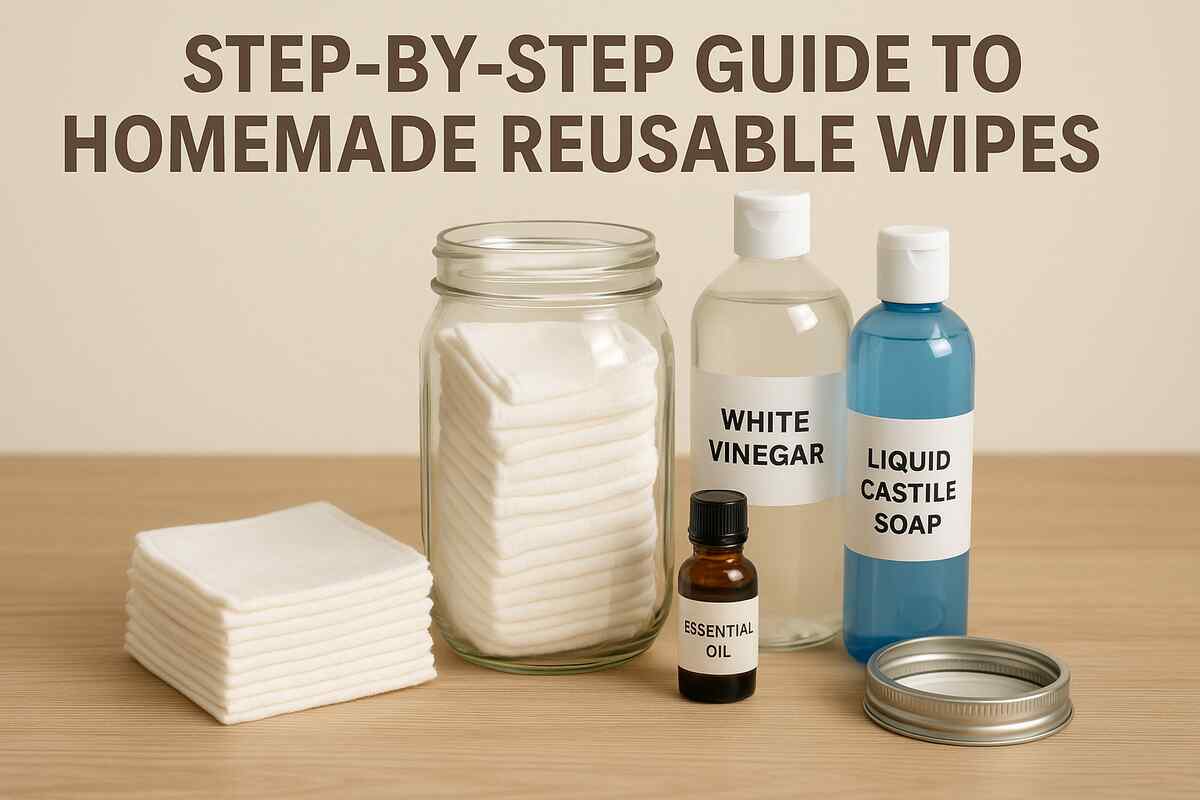Easy Steps to Make Your Own Effective Reusable Wipes at Home
Have you ever looked at your mountain of used paper towels, and asked yourself What a waste all this trash is, but is there a less environment-killing way to clean? Increasing numbers of people in today’s environmentally aware generation are moving away from single-use items in favour of greener, wallet-friendly alternatives, with reusable cleaning wipes topping their list. But how do you make them? Are they really as good as the ones bought at the store? Regardless, cultured fabric, liquid, or setting types are on the agenda. If saving money and reducing trash while maintaining a squeaky clean house or preparing for a special occasion are among your interests, then get ready to take on this very practical, easy, and enjoyable DIY task!
1. Why use Reusable Cleaning Wipes?
Cleaning wipes, which can be used again, are a very convenient, sustainable and intelligent way by bond cleaners in brisbane to use instead of disposable ones. To begin with, they are environmental friendly. Single-use wipes amount to billions of wasted wipes that reach landfills each year, adding to the waste problem. The replacement with reusable ones will allow you to save a great deal of carbon footprint. With a cleaning solution, you can decide which ingredients to use, meaning that you do not have to worry about chemicals and allergens. Finally, they are very multifunctional. They are ideal wipes that can be used to clean that kitchen countertop, bathroom sink or shiny furniture or even in your car that has dust on the dashboard.
2. What Supplies do You Need?
No specialized equipment would be required for making the cloth wipes. You will have to have cloth to make the wipes: old t-shirts, baby flannel blankets, microfiber cloths, or washcloths soft absorbent cloth will do. In the case of the container, any big-mounthed package can be used-big-mouth jars, plastic baskets, or old baby wipe dispensers. The simplest ingredients used in its cleaner are white vinegar or rubbing alcohol because it obviously is a disinfectant, liquid castile soap or a good dishwashing soap, which is used for cleaning, and last, water that is preferably filtered or boiled and cooled. You might also put in some essential oils such as tea tree, lemon or lavender to fragrance and provide some antibacterial benefit. They are all dangerous free, and even easily available in nearly all homes.
3. Preparation of the Cleaning Solution: How to Make?
The cleaning solution is very easy to mix. Put one cup of water and half a cup of white vinegar (or a quarter cup of rubbing alcohol) into it. Add either one tablespoon of liquid castile soap or a gentle dish soap. Lastly, add approximately 10 drops of the essence oil of your choice, but this is optional. After it has been mixed, pour the solution into your storage container. Next, it is time to put in your cloth wipes by neatly folding it, stacking and soaking. Pat them lightly to make them absorb the liquid. In case the wipes appear too wet, you may wring them out tolerably before using them.
4. What is the Most Appropriate Fabric to Use?
The selection of appropriate fabric contributes significantly to your wipes’ performance. Old T-shirts or towels can be used as cotton and thus are perfect when it comes to cleaning. The fine fibres that trap the dust and kill bacteria effectively make the microfiber cloth the best at subtle tasks such as cleaning mirrors, electronics or clear surfaces. Flannel, the favourite material used to make the baby blanket, is hard yet soft and because of this property,y it is ideal where it is required to wash up narrow surfaces. You can cut squares of your choice fabric in 6-inch or 8-inch measures. There is no need to sew the edges, although it will extend the life of your wipes.
5. How to Store and Utilise Your Wipes
After wipes are soaked with cleaning solution, it is advisable to keep them in a dry place as they can dry up. In case you will use a tall mason jar, think of tucking the wipes accordion-style, so that they are easily accessible. To have it handy at home, you can keep one jar in the kitchen as well as in the bathroom. When one of those spills or messes occurs, all one needs is to pluck a wipe and start cleaning. In case you are dealing with bigger messes, apply two wipes at once. Ensure you change your solution after a period of not more than 7 to 10 days to be hygienic and effective.
6. Washing and Reusing Your Wipes
Never dispose of a wipe after using it. Wash it off using warm water and get the dirt and grime out. Then, discard used wipes into the laundry basket and wash them in hot water using a natural detergent. Fabric softeners are to be avoided, because they are residual and diminish absorbency and the power to clean. After cleansing, dry the wipes with air or a tumble dryer. One should also consider keeping the sets because, at a time when one batch is being washed, another set is set to use. This rotation will make sure you will always have wipes available on demand.
7. Can the Recipe Be Altered?
Depending on your cleaning needs, you may customise the recipe. To use in disinfection, add more vinegar or rubbing alcohol and tea tree essential oil, which has antibacterial effects. On dusting, cut down on the essential oils and put in a little splash of olive oil to clear the dust more effectively. When you are making the wipes to be used with the baby, then you should opt to use distilled water, gentle baby shampoo and add a drop two of chamomile or lavender essential oil to provide a calming effect.
8. Safety rules and warnings
DIY wipes tend to be safe, although one should always do a spot test on delicate areas. Make sure to avoid a mixture of vinegar and bleach, as it has a toxic gas. Be careful with essential oils and pets, as well as children. Do not use the kitchen-bath-cloths to eliminate cross-contamination.
Conclusion
Reusable Cleaning Wipes are not only a DIY project; they are a transition to a greener way of life, a simpler life, and being in control of your home condition. You would be saving some money, not to mention waste, but you would also have the satisfaction of knowing what is cleaning your surfaces. Therefore, why not give it a shot and have cleaner spaces with a cleaner conscious? For professional help, check out rental property cleaning experts for a hassle-free end-of-lease experience.


